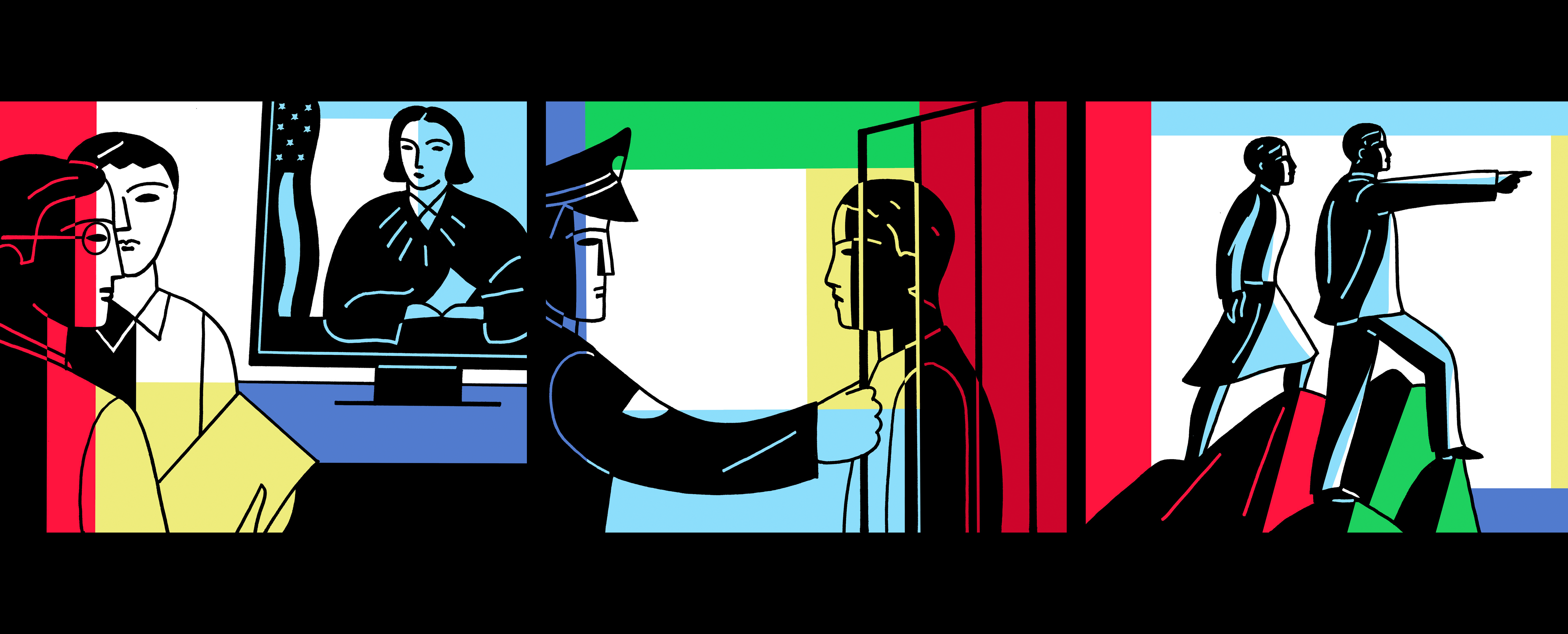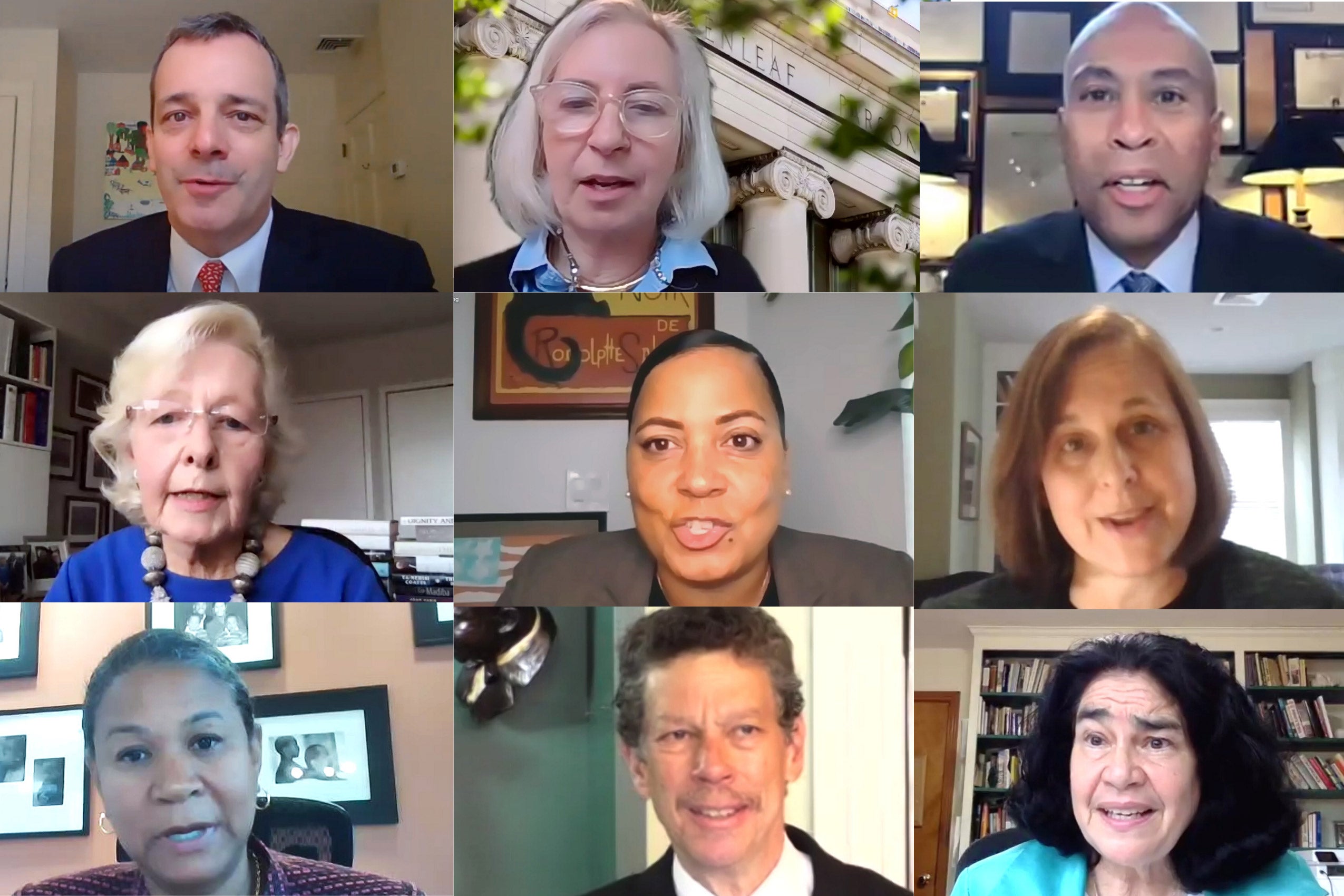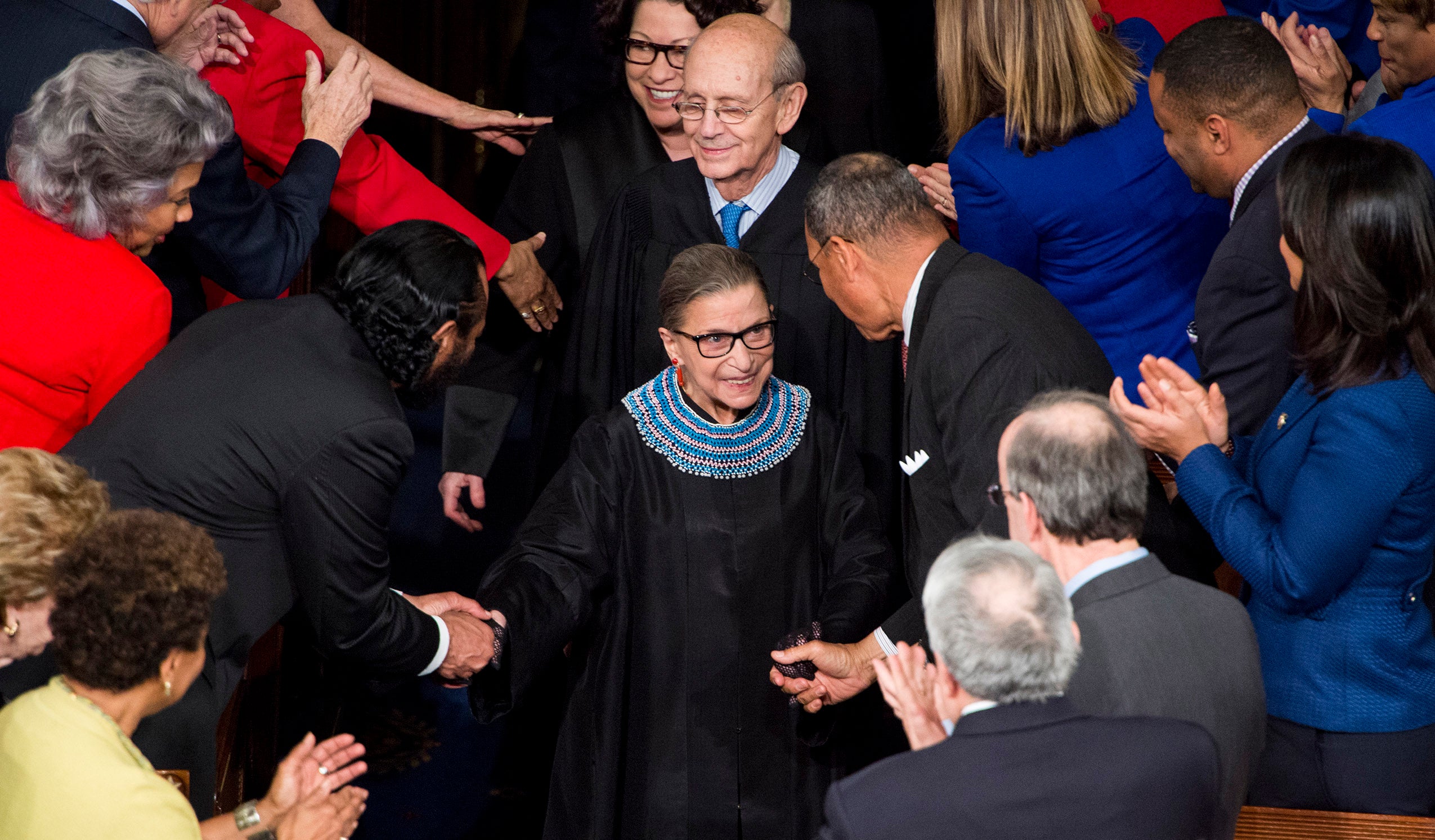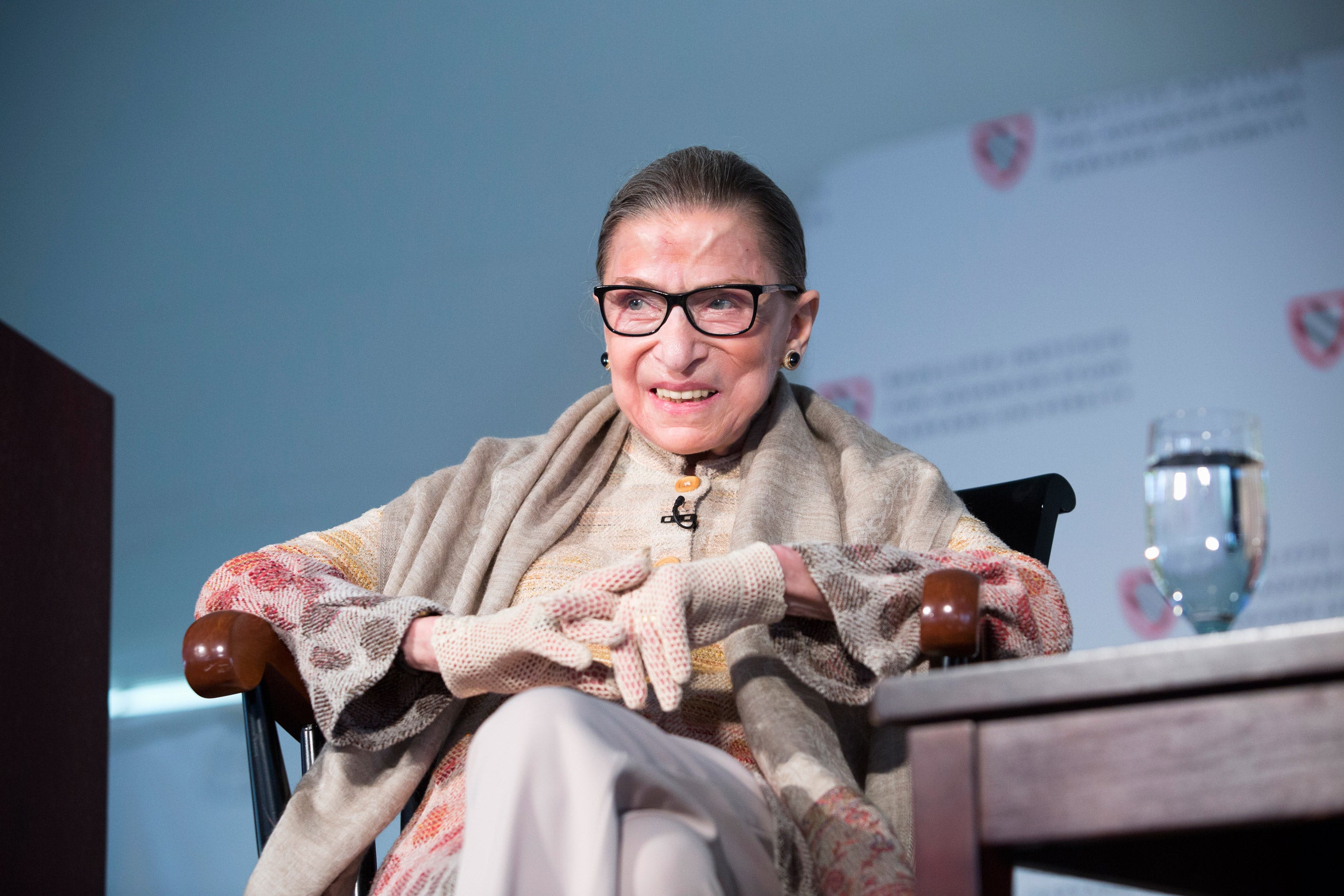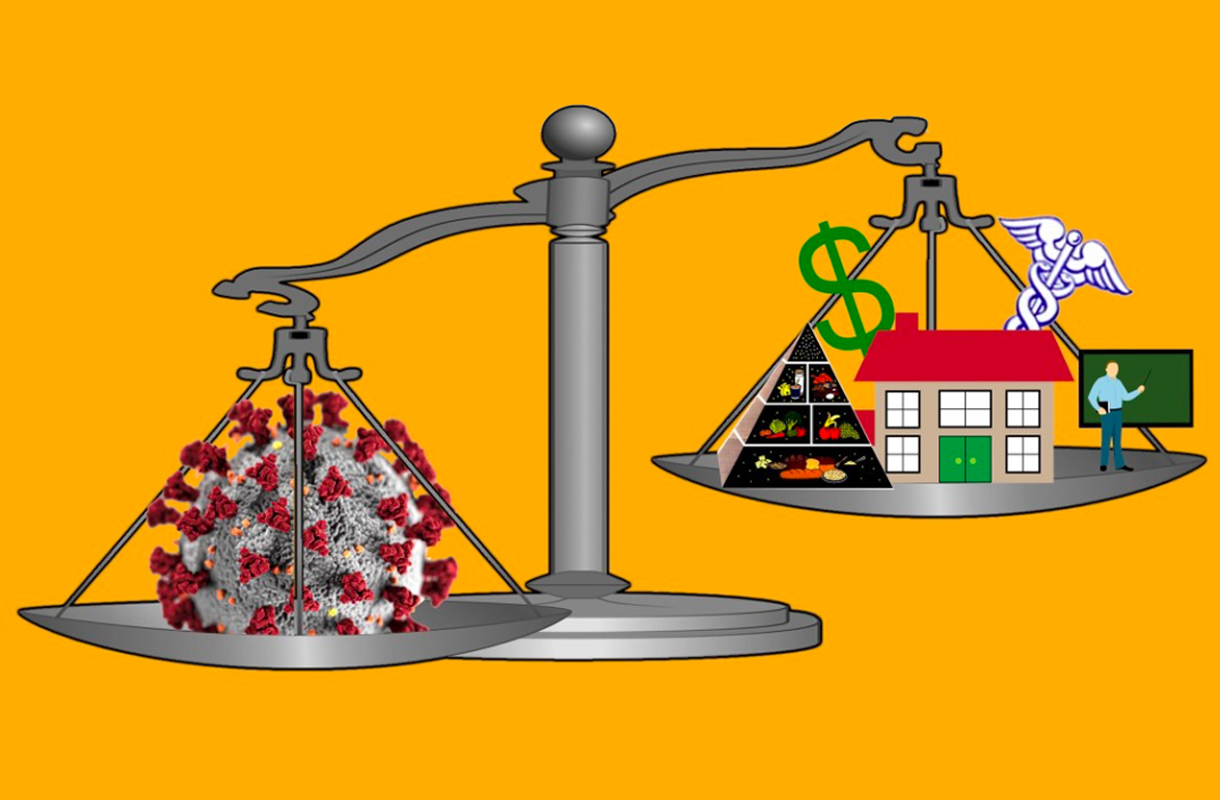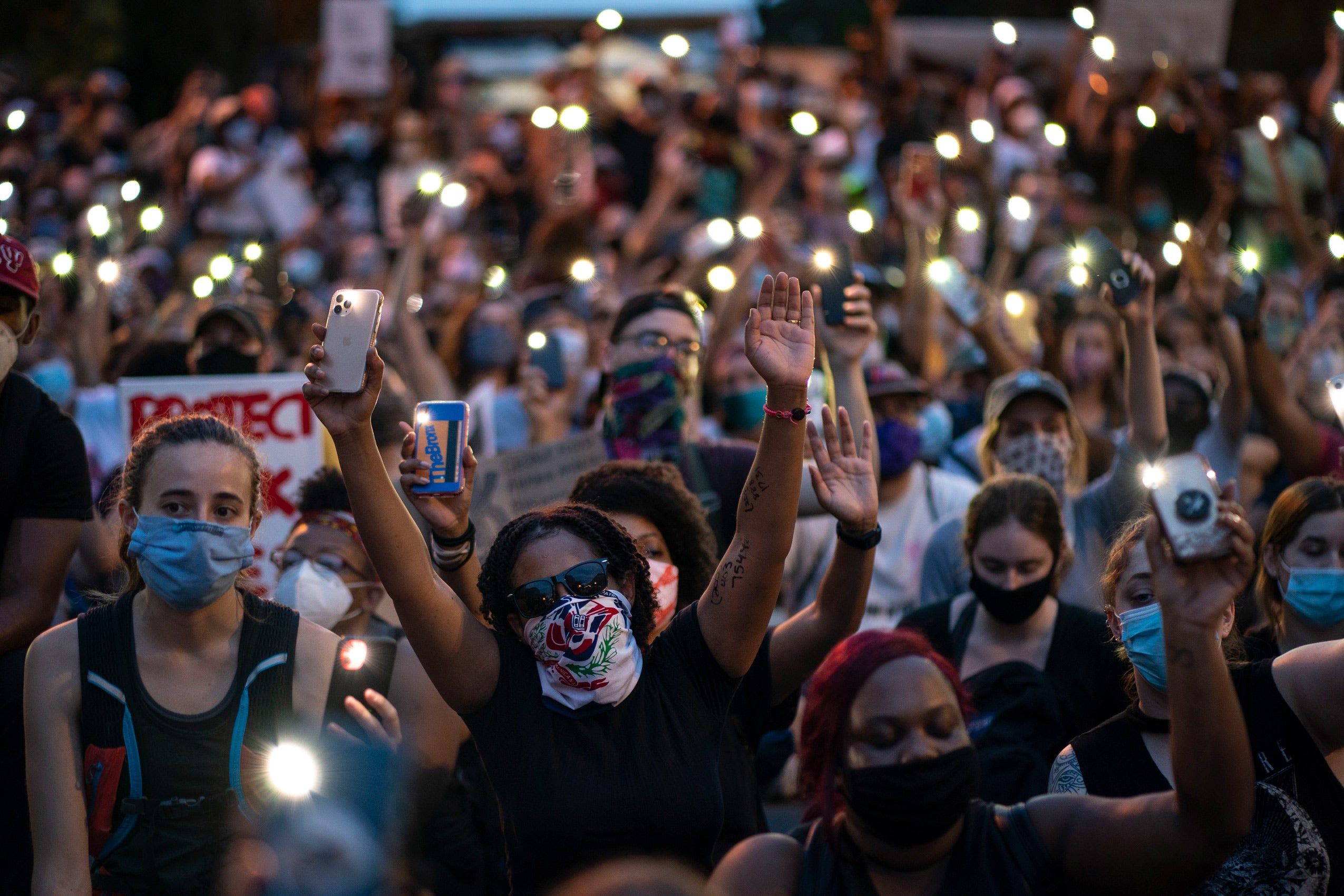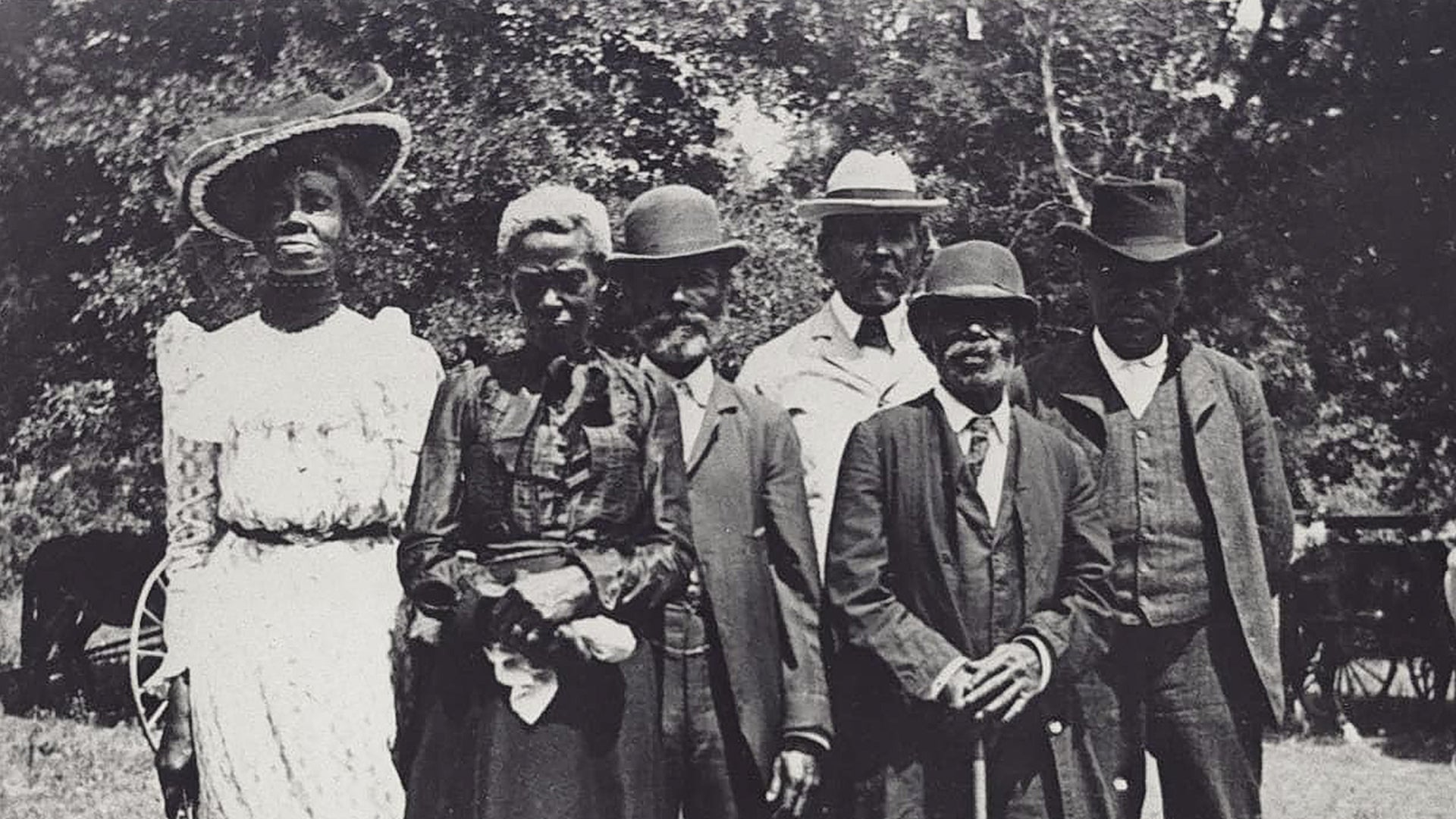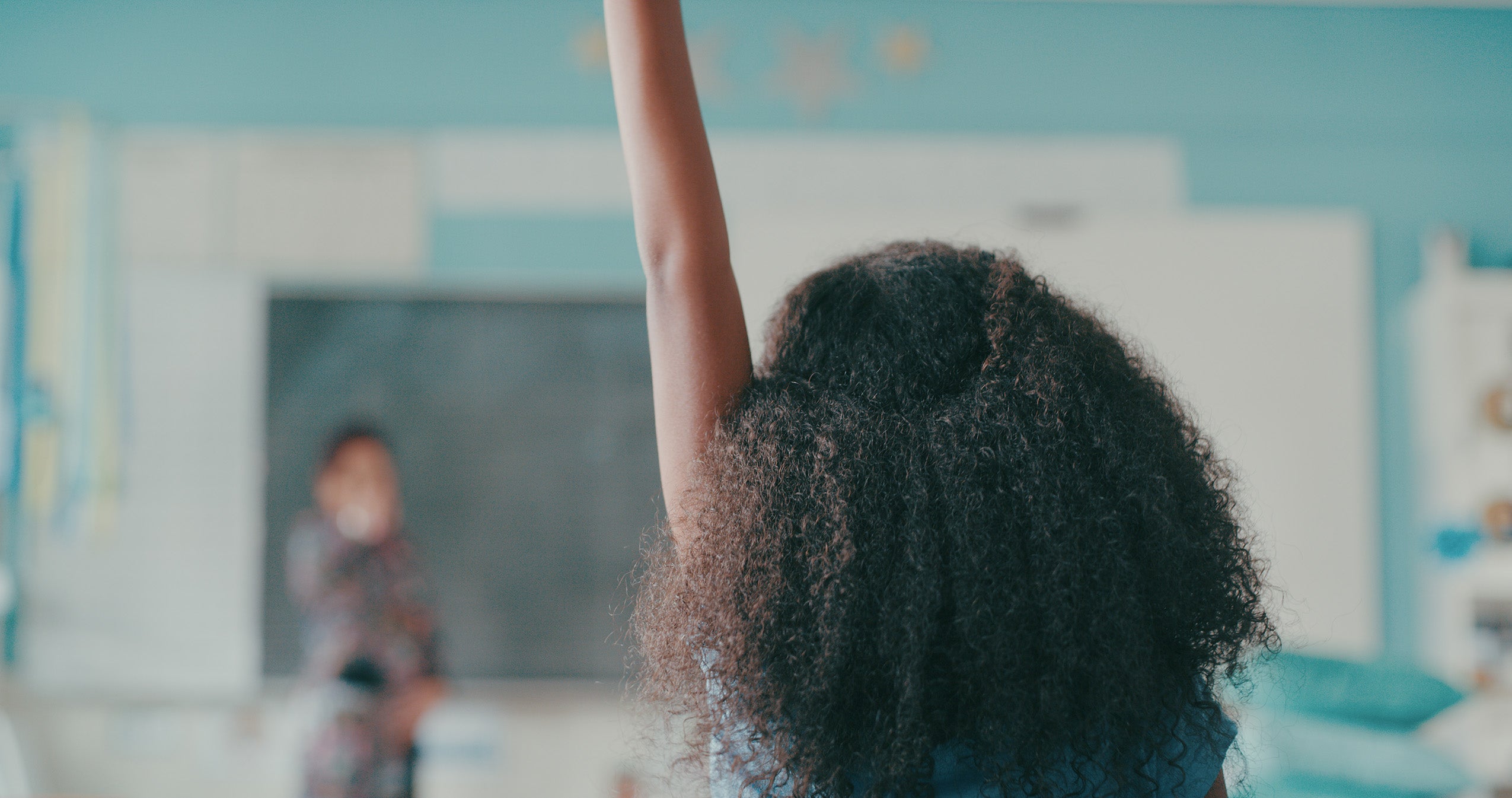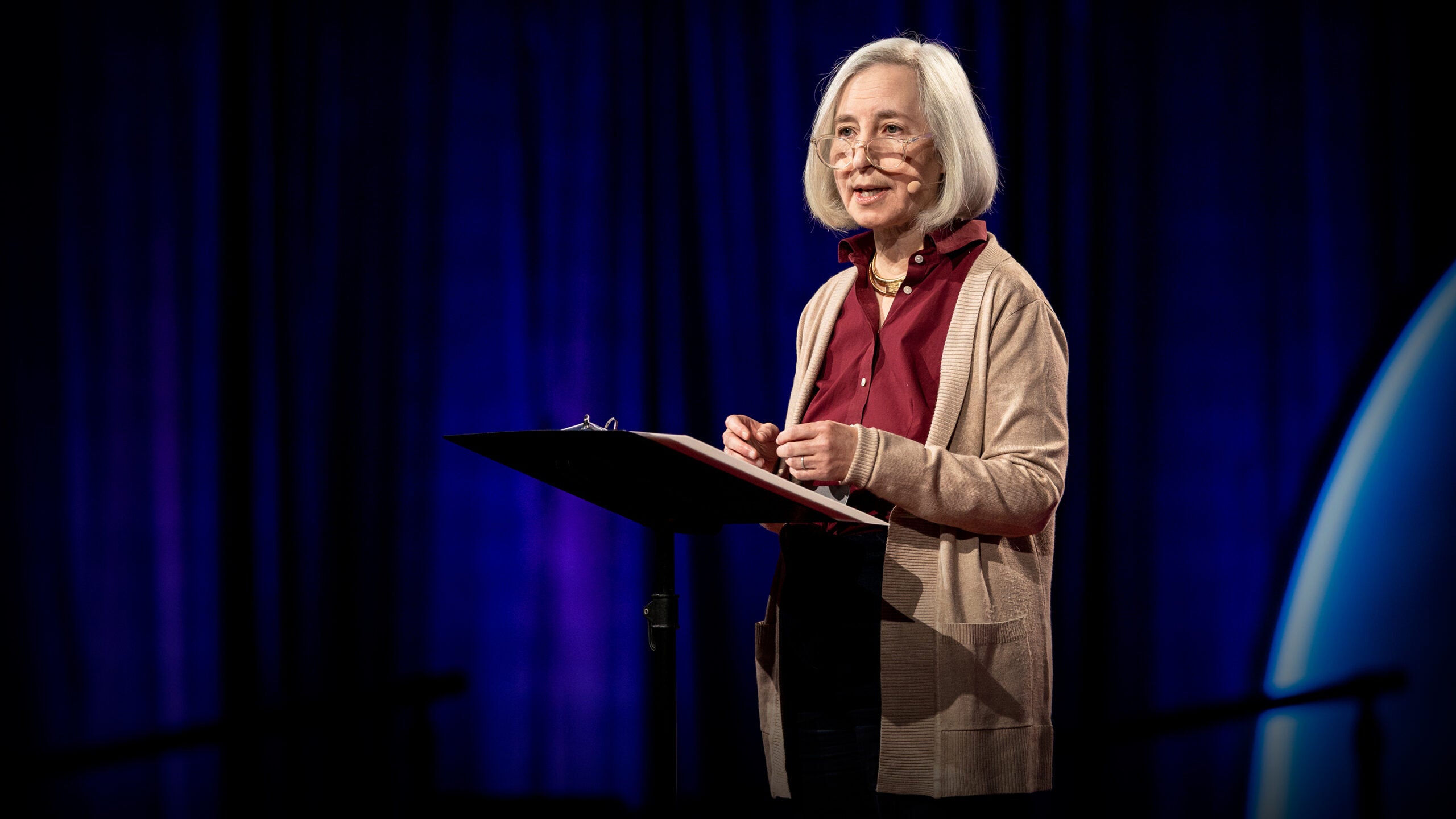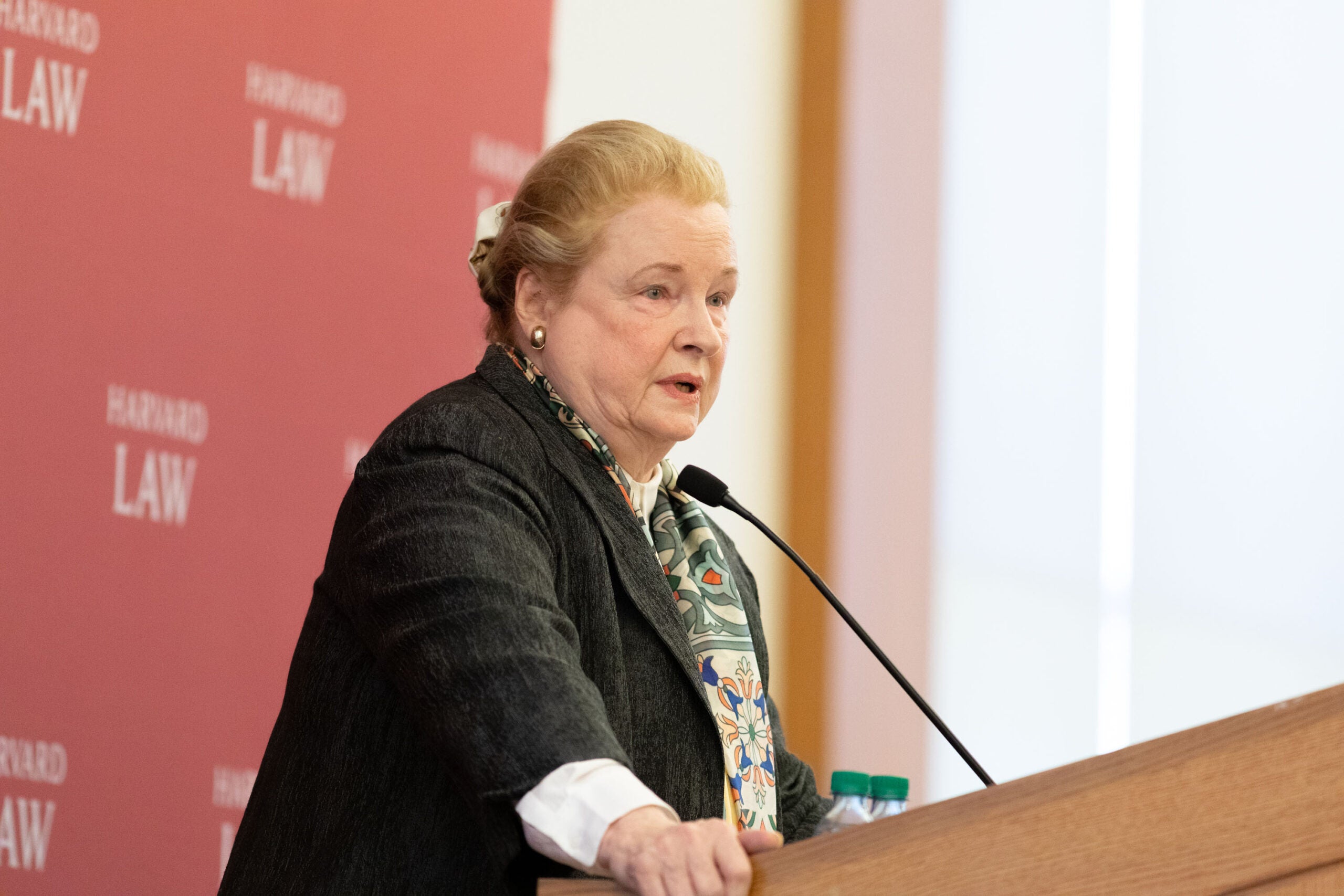People
Martha Minow
-
‘This is a once-in-a-lifetime opportunity for change’
November 19, 2020
HLS faculty on COVID-19 and the pressing questions of racism, racial injustice, and abuse of power that have driven this difficult year—and that are the focus of three new lecture series at the school.
-
Election 2020 debrief: What happened and what’s next?
November 5, 2020
In an “Election 2020 Debrief” event, a panel of Harvard Law School professors agree that the essential divisions of the American electorate remain unresolved, but find cause for some highly cautious optimism.
-
Remembering Justice Ralph D. Gants: ‘A living example of what lawyers can do to make our world better’
October 29, 2020
Massachusetts Supreme Judicial Court Chief Justice Ralph D. Gants ’80 wasn’t just a legal giant, a pride to Harvard Law School and a tireless advocate for social and racial justice. He was also, as former Governor Deval Patrick ’82 put it, “a mensch.”
-
Harvard Law School honors Ginsburg
September 28, 2020
During her first year as the sole woman on the US Supreme Court in 2006, Justice Ruth Bader Ginsburg wrote a foreword for a biography of the 19th-century lawyer Belva Ann Lockwood and presented the book to a new law clerk in her chambers. On Thursday, the clerk, Daphna Renan, now a professor at Harvard Law School, highlighted the foreword as an example of how Ginsburg broke barriers for women while simultaneously honoring her predecessors in the fight for equality. “Justice Ginsburg was a giant in the law, a luminary, and a leader, as you’ve heard, but she was always ... keenly aware of those who paved the way for her even as she trained her sights on how she could better pave it for others,” Renan said. She delivered the remarks during a virtual Harvard Law School event honoring Ginsburg, who died last Friday...Harvard Law’s current dean, John F. Manning, said the institution regrets the discrimination Ginsburg endured on campus. “It is hard to imagine a more consequential life, a life of greater meaning, and more lasting impact. And Justice Ginsburg did all of this while carrying the heavy weight imposed by discrimination,” he said. “To our eternal regret, she encountered it here at Harvard Law School.” The virtual event included tributes from Tomiko Brown-Nagin, dean of the Radcliffe Institute for Advanced Study, and Harvard Law professors Vicki Jackson, Martha Minow, and Michael Klarman...Brown-Nagin’s remarks explored what Ginsburg’s death means to the civil rights movement and comparisons between Ginsburg and the late Justice Thurgood Marshall, the first Black man to serve on the Supreme Court. Beyond fighting for women’s rights, Brown-Nagin said, Ginsburg had a deep understanding of racial discrimination and poured that insight into cases dealing with race. She cited Ginsburg’s dissent in a 1995 school desegregation case in Missouri in which the justice wrote it was too soon to curtail efforts to combat racial segregation given the state’s history of racial inequality. “The Court stresses that the present remedial programs have been in place for seven years,” Ginsburg wrote. “But compared to more than two centuries of firmly entrenched official discrimination, the experience with the desegregation remedies ordered by the [lower court] has been evanescent.” Ginsburg was, Brown-Nagin said, a “tremendous intellect, a courageous human being, and a giant of the law.”
-
‘It’s hard to imagine a more consequential life’
September 25, 2020
Supreme Court Justice Ruth Bader Ginsburg’s influence on Harvard Law School runs deep. On Thursday, September 24, a star team of Harvard deans and HLS professors remembered Ginsburg as a teacher, boss, colleague, inspiration and friend.
-
Justice Ruth Bader Ginsburg remembered by entire generations of lawyers
September 21, 2020
She entered Harvard Law School in 1956 as just one of a few women enrolled in a class of 500. A few years later, the woman who would one day sit on the US Supreme Court was famously rejected by dozens of New York City law firms because of her gender. But over the decades that followed, Ruth Bader Ginsburg built a remarkable career as a legal and cultural icon who used her intelligence and courage to fight fearlessly for social justice. And after her death was announced on Friday, entire generations of lawyers — women and men alike — grieved for a jurist whose legacy somehow transcended even the highest court in the nation. “Justice Ginsburg personified the best of what it meant to be a judge,” Harvard Law School Dean John F. Manning said in a statement. “She brought a deep intellectual and personal integrity to everything she did. Her powerful and unyielding commitment to the rule of law and to equal justice under law place her among the great Justices in the annals of the Court.” Martha Minow, a former dean of Harvard Law School, recalled Ginsburg’s impact on her own legal career. “I am one of countless people she directly encouraged and deeply inspired to use reason and argument in service of justice and humanity. Justice Ginsburg also showed that it is possible to build deep and meaningful friendships with people despite severe disagreements. At this time of deep social and political divisions, there is much to learn from her life and her commitments,” Minow said in a statement...Nancy Gertner, a retired US district court judge and a professor at Harvard Law School, said Ginsburg had inspired generations of women and wound up a reluctant pop culture icon while approaching the law as “a craftsperson who cared about the court’s precedents and was going to work within them.” “Ruth Ginsburg was more than just a brilliant scholar, and a liberal, which is what the press reduced her to,” Gertner said by phone. “She essentially created the law of gender and race discrimination. From the time she was a lawyer, a litigator, she was raising issues about the nuance of discrimination.”
-
Justice Ruth Bader Ginsburg remembered
September 19, 2020
She entered Harvard Law School in 1956 as just one of a few women enrolled in a class of 500. A few years later, the woman who would one day sit on the US Supreme Court was famously rejected by dozens of New York City law firms because of her gender. ...“Justice Ginsburg personified the best of what it meant to be a judge,” Harvard Law School Dean John F. Manning said in a statement. “She brought a deep intellectual and personal integrity to everything she did. Her powerful and unyielding commitment to the rule of law and to equal justice under law place her among the great Justices in the annals of the Court.” ... Martha Minow, a former dean of Harvard Law School, recalled Ginsburg’s impact on her own legal career.“I am one of countless people she directly encouraged and deeply inspired to use reason and argument in service of justice and humanity. .. At this time of deep social and political divisions, there is much to learn from her life and her commitments.” ... Nancy Gertner, a retired US district court judge and a professor at Harvard Law School, said Ginsburg had inspired generations of women and wound up a reluctant pop culture icon while approaching the law as “a craftsperson who cared about the court’s precedents and was going to work within them.”
-
‘We have lost a giant’: Ruth Bader Ginsburg (1933-2020)
September 19, 2020
U.S. Supreme Court Justice Ruth Bader Ginsburg ’56-58, whose lifelong fight for equal rights helped pave the way for women to take on high-profile roles in business, government, the military, and the Supreme Court, died on Sept. 18. She was 87. “Justice Ginsburg personified the best of what it meant to be a judge. She brought a deep intellectual and personal integrity to everything she did,” said John F. Manning ’85, Morgan and Helen Chu Dean and Professor of Law at Harvard Law School. “... We have lost a giant.” ... “Very few individuals in history come close to the extraordinary and significant role played by Justice Ginsburg in the pursuit of justice before she joined the bench,” said former Harvard Law School Dean Martha Minow, the 300th Anniversary University Professor at Harvard. ... “The Constitution’s heart aches at Ruth Bader Ginsburg’s passing,” Laurence Tribe ’66, the Carl M. Loeb University Professor, Emeritus, at Harvard Law School. ... Harvard Law School Professor Daphna Renan, who served as a law clerk for Justice Ginsburg during the 2006-2007 term, said: “RBG was tenacious, unflappable, and deeply wise.
-
‘We have lost a giant’: Ruth Bader Ginsburg (1933–2020)
September 18, 2020
U.S. Supreme Court Justice Ruth Bader Ginsburg ’56-58, whose lifelong fight for equal rights helped pave the way for women to take on high-profile roles in business, government, the military, and the Supreme Court, died on Sept. 18. She was 87.
-
The law is ‘tested and illuminated during this pandemic’
September 16, 2020
In the first colloquium of a sweeping new series, “COVID-19 and the Law,” five Harvard Law faculty members grappled with the challenges, limitations, and opportunities of governmental powers during a public health crisis.
-
Study spotlights racial disparities in state criminal justice system
September 10, 2020
A new report prompted by the huge overrepresentation of blacks and Latinos in Massachusetts prisons zeroes in on disparities at various stages of the court system’s handling of cases that are factors behind the disparate incarceration rates. The report, commissioned by Supreme Judicial Court Chief Justice Ralph Gants and carried out by researchers at Harvard Law School, found that among those who are incarcerated, black and Latinx defendants receive sentences that are, on average, about five months longer than sentences for white defendants. Meanwhile, white defendants are more likely than black and Latinx defendants to have cases resolved through pretrial probation or other dispositions that don’t lead to incarceration. Four years ago, Gants highlighted the huge racial disparities in incarceration rates in his annual address on the state of the judiciary, and announced that Harvard Law School dean Martha Minow had agreed to launch an independent evaluation of the factors driving those inequities. In the report released on Wednesday, researchers from the Criminal Justice Policy Program at Harvard Law School found that racial and ethnic differences in the type and severity of the initial criminal charge against defendants account for over 70 percent of the disparities in sentence length. “The initial charging decision is in fact a huge driver of these large disparities in who is incarcerated,” said Felix Owusu, a Harvard PhD student and co-author of the report. It was already well known that people of color are overrepresented in Massachusetts state prisons. A 2014 report of the Massachusetts Sentencing Commission found that the state was imprisoning black people at a rate of 7.9 times that of white people and Latinx residents at 4.9 times the rate of whites. The new report, using administrative data from the Massachusetts Trial Court, Department of Criminal Justice Information Services, and Department of Correction, attempts to break down racial disparities at various points as defendants move through the legal system.
-
When can the law be used as a tool for reconciliation and repair instead of punishment? That’s the central question of Harvard Law Professor Martha Minow’s “When Should Law Forgive?” which explores how entities and communities in the United States and abroad utilize truth commissions, reparations, and debt forgiveness—alternatives that fall under the mantle of what’s known as restorative justice—to address wrongs and create a better future. The idea of forgiveness and reconciliation as an alternative to vengeance is hardly new, but the recent focus on racial injustice and the school-to-prison pipeline is breathing new life into the restorative justice movement. We recently caught up with Minow to find out more about restorative justice and the inroads it is making...You have been writing about law and forgiveness for more than a decade. How did you get interested in the topic? "I started from a different direction. I wrote a book published in 1998 on legal responses to mass atrocities and called it, 'Between Vengeance and Forgiveness,' because I came to see prosecutions, truth commissions and reparations as efforts to use law and other social instruments to help society steer a path between vengeance—which seemed to me terrible—and forgiveness—which seems to me beyond the capacity of most human beings, including me. As I worked on that, there were many interesting reactions. I kept hearing over and over again, 'We need a truth and reconciliation commission in our school or community.' That really led me to think more about it. And I had many people say, 'Why can’t law itself forgive?' It was the result of being in conversations with a lot of people."
-
American Autocracy
August 10, 2020
The late innings of Donald Trump’s four-year campaign in the White House come to look stranger than the big-league baseball season—both of which are in the deep shadow of the pandemic (13 St. Louis Cardinals tested positive this week). It’s the president who has to answer for a thousand COVID deaths a week in midsummer U.S.; China has next to none. Another president might wilt at the breaking of his boom economy, or the prosecution coming from Manhattan on charges of bank and tax fraud in the Trump organization. But this man surges, Trump-style: he’s all for U.S. military shock troops to quell local protests that he’s provoked; he tweets his preference that the election ninety days away be cancelled. What we know about our presidential race 90 days from the finish, perhaps all anyone knows, is that a wounded Donald Trump will not go quietly, if he goes at all, if he does not invoke emergency powers to cancel the election. The thought this hour was—and still is—to draw out the astute Russian-and-American diagnostician Masha Gessen, a resistance figure in two countries and author of a new book titled Surviving Autocracy. But then the plot thickened, particularly around the mayhem in Oregon after federal shock-troops had landed, over the objections of state governor, city mayor, and a militant wall of moms. A grave but lonely warning turned up in a New York Times guest-opinion piece. It was written by the sometime Colorado senator and presidential candidate Gary Hart, who joined this week’s conversation from his cabin a few mountains away from Denver. Martha Minow, a professor at Harvard Law School, also joins.
-
Harvard Law faculty summer book recommendations
July 30, 2020
Looking for something to add to your summer book list? HLS faculty share what they’re reading.
-
A Killing in Broad Daylight
July 23, 2020
In the wake of the killing of George Floyd, legal scholars see a moment of reckoning.
-
Our justice system is flawed and inequitable, says Harvard law professor Martha Minow. She calls for a reset to emphasize accountability, apology, and service, rather than punitive punishment. Martha Minow is a professor at Harvard Law School, where she has been teaching since 1981. Previously, she served as the Dean of the Law School between 2009 and 2017. She is an expert in human rights and advocacy for members of racial and religious minorities, women, children, and persons with disabilities. She also writes and teaches about privatization, military justice, and ethnic and religious conflict. Minow is the author of several books. Her most recent title is When Should Law Forgive? Minow received her undergraduate degree from the University of Michigan, her master's degree in education from the Harvard Graduate School of Education, and her JD from Yale Law School.
-
‘Juneteenth is a day of reflection of how we as a country and as individuals continue to reckon with slavery’
June 18, 2020
Tomiko Brown-Nagin spoke with Harvard Law Today about the history of Juneteenth and its particular relevance more than 150 years later.
-
‘Deeply Unlawful’: Harvard Law School Faculty Condemn Trump’s Response to Police Brutality Protests
June 8, 2020
Members of the Harvard Law School faculty published an open letter to students and Harvard affiliates Monday criticizing President Donald J. Trump for calling for a military response to ongoing protests against police brutality. The letter received signatures from 160 faculty members, including former Law School Dean Martha L. Minow and former United States Ambassador to the United Nations Samantha J. Power. It was reopened for signatures on June 2 after requests from additional Law School teaching faculty and law librarians. The authors of the letter denounced a tweet posted by Trump on May 29 which included the phrase “when the looting starts, the shooting starts” in reference to nationwide protests following the killing of George Floyd by Minneapolis police. They argue the president’s language encourages violence by private citizens. “By legitimating lawless action by public officials, the President’s tweet invites other individuals to take similarly destructive action,” the letter reads. The White House press office did not immediately respond to a request for comment. Law School professor Christine A. Desan, who worked on drafting the letter, said Trump’s tweet signified a commitment to using violence against citizens involved in the protest. She said she finds the message problematic since Trump speaks as the Commander in Chief of the Army. “We don't under our Constitution live in a society where even if somebody is stealing something they get shot,” she said. “To have him pledge to use excessive state violence against people indiscriminately is really unlawful — deeply unlawful.”
-
In late April, a federal appeals court handed an unprecedented win to schoolchildren, becoming the first appellate federal court in American history to conclude that children have a fundamental right to a minimum education that provides basic literacy.
-
Martha Minow shared her thoughts on the subject of law and forgiveness, a focus of her most recent scholarship at TEDWomen, an annual conference that highlights the contributions and ideas of notable women across a number of fields.
-
Who needs foreign law?
March 4, 2020
The late Supreme Court Justice Antonin Scalia ’60 believed America had much to learn from laws adopted by nations abroad, according to Harvard Law School Professor Mary Ann Glendon. In an address titled “Who Needs Foreign Law?,” Glendon, the Learned Hand Professor of Law, gave a clear, if somewhat surprising, answer: Scalia did.
